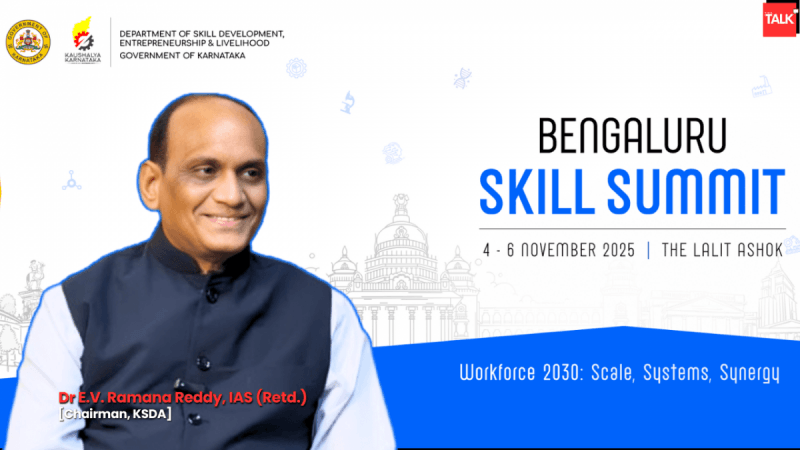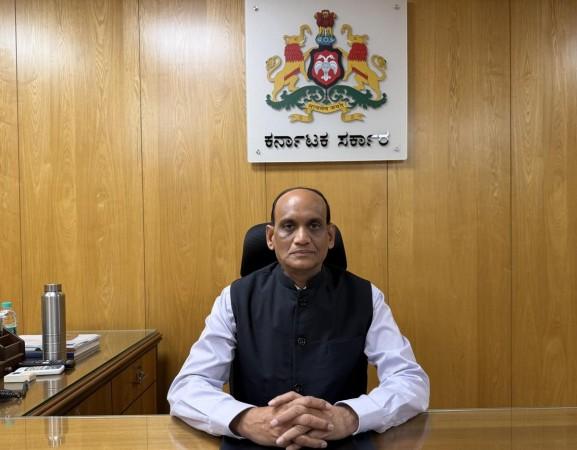
In a world rapidly transformed by AI, automation, and changing job landscapes, Karnataka is taking a decisive step to future-proof its youth. In an exclusive interview with International Business Times on The Talk, Dr. E.V. Ramana Reddy, Chairman of the Karnataka Skill Development Authority (KSDA), unpacks the vision behind the Bengaluru Skill Summit 2025 and the state's ambitious goal to build Workforce 2030.
"Nobody will ask you what is your degree. Everybody will ask you — what can you do,"
Dr. Reddy told IBT, capturing the essence of the state's new skill-first policy.
Under the leadership of the Department of Skill Development, Entrepreneurship & Livelihood (SDEL), Karnataka has rolled out a seven-year Skill Development Policy aligned with its trillion-dollar economic roadmap. The first-ever Bengaluru Skill Summit, scheduled from November 4–6 at The Lalit Ashok, aims to bring together government leaders, global industry experts, academia, and youth delegates to build a unified skill ecosystem.
Dr. Reddy explained that Karnataka, already a top performer in GDP, exports, and GST collections, is now turning its focus to human capital.
"We said we wanted to become a trillion-dollar economy — now we have a roadmap for that. For the first time, Karnataka has a Skill Development Policy that is both actionable and measurable. The Summit is where big minds and the entire ecosystem come together to make that vision real," he said.

The Bengaluru Skill Summit 2025, themed "Workforce 2030: Scale, Systems & Synergy," will feature policy dialogues, a Skill Expo showcasing innovations, a Skillathon for student innovators, and the Kaushalya Karnataka Awards celebrating excellence in vocational training. The initiative is backed by a Rs 4,432-crore state investment in skilling and is set to redefine how education aligns with employability.
Highlighting the shift from theory-based education to hands-on learning, Dr. Reddy drew global parallels. "Our education was 100 percent theory-oriented—when you came out, you were not useful to the industry. In Germany, 30 percent of time is spent in classrooms and 70 percent in industry. That's what we're bringing to Karnataka," he said.
The Summit will focus on priority sectors including AI, cybersecurity, green jobs, advanced manufacturing, and soft-skill development. According to Dr. Reddy, skilling is no longer optional but foundational.
"Degrees may become irrelevant — lifelong learning is the new reality," he stressed.
Encouraging Karnataka's youth to participate in the upcoming event, he added: "This Summit is not just for policymakers or corporates—it's for students, job seekers, entrepreneurs, and anyone looking to adapt to the new world of work. I invite every young person in Karnataka to be part of this transformation."
Excerpts from the interview:
IBT: For someone hearing about it for the first time—what exactly is this summit?
Dr Ramana Reddy: I will just tell you one minute about the state as such—Karnataka is one of the progressive states. Most of the economic parameters, like GDP, direct tax collection, indirect tax collection, GST, and exports, we are almost in the top two or three.
Two years back, we said we wanted to become a trillion-dollar economy. As a follow-up to that, we had to come out with a roadmap for achieving it.
So what we have done is come out with a Karnataka Skill Development Policy—the first policy for the state—where we have given a roadmap for what we want to do in the next seven years.
While doing that, we felt that, just like the IT Department has its own platform, the Skill Department should have a stage where intellectuals, big minds, industry, and the entire ecosystem can meet every year. So, because of that, we planned the Bengaluru Skill Summit — as you said, it's the first edition.
The theme is "Workforce 2030: Systems, Scale, and Synergy." We have chosen these three words carefully. One is about strengthening systems—part of this ecosystem we want to improve—and the cabinet has approved a Rs 4,432 crore plan for the policy period. The second is about scaling up, because today, for example, Karnataka's GDP is $350 billion.
In the last decade, Karnataka grew at 8%, and now we are targeting 9–10%. If we continue at that pace, we may reach $700 billion, but we want to touch $1 trillion—so we have to plan for that. With this background, we have organized this summit.
The summit has a two-day conference. On the 4th, the Chief Minister will inaugurate it, and the 5th and 6th will have full sessions. Both days will feature about 12 to 13 round tables. There is also an expo.
We have also run a Skill-a-thon across the country, with about 5–6 states participating for the first time. The finals of the Skill-a-thon will be held during the summit.
For the first time, we are introducing the Kaushalya Karnataka Awards to recognize private and government partners who have done well in the skilling ecosystem.
Participants include policymakers—even a minister from Mauritius is coming. Germany has become the country partner. Industry representatives, CHROs, NGOs, and especially youth and employment seekers—for whom this is primarily meant—will also attend.
For employment seekers or youth, the advantage of attending is that they will have direct exposure to what is happening today, along with access to the industry. Such connects are important—and this summit will provide that platform. Even for college students or job seekers, the summit holds great significance.
Youth and employment seekers are a big priority for us. When we planned delegate participation, we ensured students were represented. Out of around 1,000–1,500 participants, we have reserved 300–400 seats for students.
IBT: How does that early experience shape your current approach to the Bengaluru Skill Summit?
Dr Reddy: Basically, BengaluruIT.com started in 1998 in ITTF Bengaluru. But in 2000, what happened was, under Chief Minister S. M. Krishna, the country for the first time started a separate department for IT and Biotechnology.
I am proud to say I was the Director of IT and BT — head of the department — from 2000 to June 2003, about three and a half years. During that time, I held about three BengaluruIT.com and three BengaluruBio.com events.
Later, around 2017, they were merged to form the Bengaluru Tech Summit. I was again fortunate that in the last four years of my service, I was Additional Chief Secretary in charge of IT and Biotech — and conducted four editions of the Bengaluru Tech Summit.
Even during COVID, we held it in hybrid mode and continued. In 2022, we celebrated the Silver Jubilee of the Bengaluru Tech Summit. For about one and a half years, I was also Additional Chief Secretary, Industries.
This long exposure to IT, BT, and Industries has definitely helped — and is helping me now as Chairman, Karnataka Skill Development Authority. Most ecosystem partners are known to me.
With this background, we planned the Bengaluru Skill Summit. The curtain-raiser was held on September 19th — we had just about one and a half months, but still managed to bring excellent speakers and organize everything. This was possible because of my previous experience and network.
IBT: What kind of targeted interventions or policy shifts are being discussed at the Summit to address youth unemployment challenge?
Dr Reddy: The biggest problem so far is that, as a country and as a state, we have concentrated only on formal education — we never treated skill as equally important. Every time, degrees and certificates were prioritized over skills.
There was a study that said 85% of our graduates are unemployed — they have a degree but no employability. Why? Because their curriculum is outdated. There was little interaction with industry and no curriculum updates.
So even after hiring, companies had to train them again.
But as far as Karnataka is concerned, our unemployment rate among graduates is lower than the national average. We have taken care of this industry-academia gap in our policy.
We have several programs where industry participates directly in the state's skilling initiatives — from designing curriculum to offering internships and apprenticeships. We even have a plan for industries to take over ITIs and polytechnics.
In fact, we have the "100 AI Scheme" — where we want 100 industries to adopt 100 academic institutions.
So, both in policy and in the summit, we are focusing on stronger industry-academia linkages — so that graduates come out job-ready.
IBT: We often hear that India doesn't lack degrees — it lacks job-ready skills. In your perspective, how can the Skill Summit become a turning point in bridging that disconnect?
Dr Reddy: Now people are saying degrees will become irrelevant in the near future. Nobody will ask you what degree you have; they'll ask what you can do.
Our education has been 100% theory-oriented and exam-driven. When students graduate, they're not useful to industry.
Now, we're focusing on practical, skill-based learning. In countries like Germany, for example, 30% of time is spent in classrooms and 70% in the industry.
We're planning similar models here. We want more practical-oriented vocational education, and stronger industry-academia connections.
One good example is GTTC — the Government Tool Room and Training Centre. If someone comes from an ITI, the placement rate is 15–20%, but GTTC achieves 100%.
That's because GTTC students spend 70% of their time on the shop floor — either in the GTTC itself or through internships in industry.
So, our focus for the next five years — both in content and in policy — is to make vocational education more practical-oriented.
IBT: What are your expectations from it, particularly from the private sector with regard to sustaining long-term skilling initiatives for the future workforce?
Dr Reddy: Till now, vocational institutions and industries worked separately. Now, our focus is on building stronger connections between the two.
I recently participated in a CII conference, where I told industry leaders that setting up labs in ITIs or polytechnics is good, but not enough on a larger scale.
I requested CII to coordinate with the state government — not just by setting up labs, but by getting involved right from curriculum development to practical training.
In many foreign countries, industry professionals even take a sabbatical to teach. We want to encourage that system here too.
This is fundamental, and this is our focus.
IBT: If you had to pick the top three skills that will define employability in the next few years, what would they be?
Dr Reddy: One — everybody talks about Artificial Intelligence. Whenever a new technology comes — computers, internet, cloud computing — people say jobs will disappear. But someone rightly said: your job won't go, it'll be taken by someone who knows AI.
So, AI is essential in every field — from schools to colleges.
Second, cybersecurity. Every year, the world loses $10 billion to cybercrime. India's GDP is $4 trillion — and globally, we're losing 2.5 times that to cybercrime.
Last year alone, Bengaluru lost ₹2,000 crore to cybercrime. So AI and cybersecurity are both critical skills.
Third, sustainability and clean skills are gaining importance.
And beyond all this — your soft skills, or as we call them now, light skills — communication, reasoning, logical thinking — are vital.
Recently, I read that Accenture has started hiring not just IT engineers but also graduates from social sciences, commerce, and even journalism backgrounds — and they plan to train them in AI.
So tomorrow, what matters is not your degree but your skills — both technical and soft.
IBT: What's the one outcome you personally want to see by the end of this Summit?
Dr Reddy: By the end of the summit, I want meaningful partnerships and ideas to emerge. Summits are platforms to understand global best practices and innovations.
Since Germany is the country partner and the Mauritius Minister for Labour and Industrial Relations is participating — along with eminent speakers from across India — we expect valuable insights.
For example, at a recent CII Skills Summit, I got great ideas from other states — which we are now developing into policies.
Ultimately, what I've seen in the skilling sector is that earlier, once you got a degree — say a PhD in agronomy — that was it. You never learned again.
But now, lifelong learning is essential. You can't say, "I've learned enough." Your learning may be outdated in a year.
So the theme today is simple: degrees are not important — skills are. And lifelong learning is the key.
IBT: What message would you like to share with the youth of Karnataka as they look forward to the Bengaluru Skill Summit 2025 and beyond?
Dr Reddy: I want to tell the youth of Karnataka that you are in a highly progressive state. Our economy is among the best-performing in the country.
So, I urge all young people and employment seekers to participate in the Bengaluru Skill Summit — to gain exposure, access, and connections with the industry and academia.
This will help you shape your future.

















